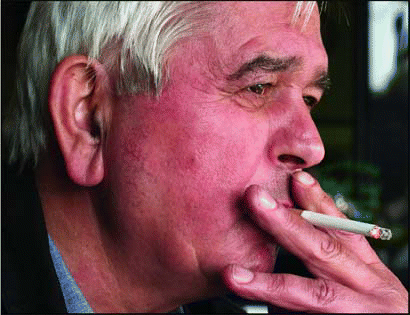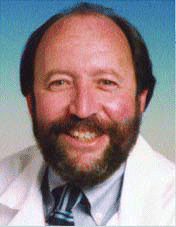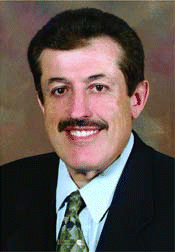Chronic rhinosinusitis affects approximately 30 million Americans. More than 200,000 sinus procedures are performed annually in the United States in an effort to provide relief to individuals who suffer from chronic rhinosinusitis.1 Many factors are believed to cause and/or exacerbate symptoms of chronic rhinosinusitis, including smoking. However, the prevailing opinion to date has been that people who smoke may not receive sufficient benefit from endoscopic sinus surgery for chronic rhinosinusitis to make them good candidates for the procedure. Based on studies supporting this belief, many surgeons recommend against endoscopic sinus surgery for active smokers. Some surgeons suggest that patients refrain from smoking for several weeks prior to and following surgery; however, it may not be realistic to expect that a patient addicted to nicotine will comply with these instructions. A new study presented at the Combined Sections Meeting of the Triological Society in February suggests that smokers may, in fact, achieve significant benefit from endoscopic sinus surgery for chronic sinusitis, at least in the short term.

The study, authored by Subinoy Das, MD, Adam M. Becker, MD, J. Drew Prosser, BS, and Stilianos E. Kountakis, MD, PhD, of the Department of Otolaryngology-Head and Neck Surgery, Medical College of Georgia, has been submitted for publication. Dr. Kountakis, Professor and Vice Chair of the Division of Rhinology and Sinus Surgery Chief and Residency Program Director of the Department of Otolaryngology-Head and Neck Surgery at the Medical College of Georgia, offered some highlights of the study in a telephone interview.
First and foremost, Dr. Kountakis stressed that the study’s authors in no way advocate smoking. The countless risks of cigarette smoking to an individual’s health in general are well documented, and the benefits to quitting are inarguable. Dr. Kountakis stated, None of us recommend that people should continue to smoke. We did an open-minded investigation to find out what the risks of smoking related to endoscopic sinus surgery truly are. We still recommend that people quit smoking.
According to Dr. Kountakis, the purpose of the study was to prospectively compare the benefit of endoscopic sinus surgery to smokers and nonsmokers utilizing the Sino-Nasal Outcome Test-20 (SNOT-20). The study included 225 patients who were diagnosed with chronic rhinosinusitis according to the criteria of the Rhinosinusitis Task Force of the American Academy of Otolaryngology-Head and Neck Surgery. The patients were offered endoscopic sinus surgery for chronic rhinosinusitis after failing at least four weeks of medical therapy, although operative data were available on only 221 patients. Forty-nine patients were smokers; 172 patients were nonsmokers.
Quality of Life Improves for Smokers and Nonsmokers
All patients involved in the study completed the SNOT-20 preoperatively and postoperatively. The preoperative SNOT-20 scores were similar for both groups, with an average score of 26.2 for smokers and 27.8 for nonsmokers. At three- and six-month follow-up, all patients showed improvement on their SNOT-20 scores. Surprisingly, smokers showed a greater overall short-term improvement in quality of life following surgery, with SNOT-20 scores averaging 5.7, compared with nonsmokers, whose SNOT-20 scores averaged 10.1. These scores reflect an improvement in score of 22.1 for smokers and 16.1 for nonsmokers.
Dr. Kountakis summarized, Basically, the conclusion of our study was that both smokers and nonsmokers had a great improvement in quality of life following endoscopic sinus surgery.
The 2005 Laryngoscope study cited earlier also seems to suggest that smoking may not be as predictive of poor surgical outcome as previously believed. This study showed no significant difference between smokers and nonsmokers in preoperative CT, pre- and postoperative endoscopy, and change in endoscopy scores. Smokers and nonsmokers also demonstrated similar improvement in postoperative Rhinosinusitis Disability Index (RSDI) and Chronic Sinusitis Survey (CSS) scores. This particular study concluded that acetylsalicylic acid intolerance and clinical depression are more predictive of poorer clinical outcomes following endoscopic sinus surgery than smoking.
It is generally acknowledged that the nasal mucosa is adversely affected by cigarette smoking in several ways. Heat and toxic elements may directly destroy ciliary cells. Tobacco smoke can cause irritation and inflammation. Production of cytokines, including interleukin-5, interleukin-8, and granulocyte-macrophage colony-stimulating factors are suspected to be a primary cause of inflammation of the sinuses. For these reasons, it is believed that patients who continue to smoke following surgery will receive minimal benefit from surgery and are more likely to require revision surgery. Smoking has also been shown to have a negative impact on surgical outcomes in general, potentially causing postoperative complications including delayed wound healing and increased risk for infection.
Another study, published in Laryngoscope in April 2006, concluded that smoking is a factor that adversely affects frontal sinus surgery outcomes. The authors of this study conducted follow-up on 157 patients four years following initial frontal sinus surgery for persistent symptoms of nasal blockage or congestion, headache, postnasal drip, and nasal discharge. All patients included in this study had failed at least four weeks of medical therapy before undergoing surgery. Fifty-two patients required revision surgery. Of these, 59.6% were smokers. After undergoing revision surgery, approximately 90% of all patients reported at least some overall improvement in their symptomatology. However, the authors found a statistically significant poorer outcome in all categories in patients who smoked.2
Smokers May Have Other Confounding Factors
Marvin P. Fried, MD, Program Director and University Chairman of the Department of Otorhinolaryngology-Head and Neck Surgery at Albert Einstein College of Medicine and Montefiore Medical Center in New York, acknowledged, The literature tends to favor that smoking predicts a negative outcome for endoscopic sinus surgery.
He also acknowledged that smokers may have a propensity to have more symptoms of recurrent infection or nasal obstruction and may not heal as well following surgery. He further stated, The overwhelming number of articles show that kids who are exposed to smoke, or adults who smoke, don’t do as well as nonsmokers following surgery and, also, that smoking along with infection, pollution, allergies, and fungus all are some of the predisposing factors to sinus disease.
Dr. Fried also agreed that it is always preferable that patients quit smoking-for a variety of reasons. However, in his opinion, the indications and contraindications for endoscopic sinus surgery are the same for smokers and nonsmokers. If the patient suffers from symptoms of recurrent infection or nasal obstruction that have not responded to medical treatment, he considers surgical intervention regardless of whether or not the patient is a smoker. He stated, If a patient needs sinus surgery, I would not withhold it simply because he or she is a smoker. There is so much benefit from surgery that smoking alone is not a prohibitive factor.
He further opined, Bad surgical technique is a worse issue, in my opinion, than whether or not the patient is a smoker.
Dr. Kountakis cautioned that the Medical College of Georgia study did have some limitations. The patients involved in the study were all treated at a single institution. The study was based on short-term (three- and six-month) follow-up. Continued smoking may well affect patients’ long-term symptomatology and increase the need for revision surgery for smokers. He states that additional studies, including longer-term follow-up, are needed to draw more solid conclusions regarding the true benefits of endoscopic sinus surgery for smokers. He concluded, This is only a short-term study. We will continue to follow the patients and see what happens long-term.
References
- Smith TL, Mendolia-Loffredo S, Loehrl T, et al. Predictive factors and outcomes in endoscopic sinus surgery for chronic rhinosinusitis. Laryngoscope 2005;115:2199-2205.
- Friedman M, Bliznikas D, Vidyasagar R, et al. Long-term results after endoscopic sinus surgery involving frontal recess dissection. Laryngoscope 2006;116:573-9.
©2007 The Triological Society


Leave a Reply